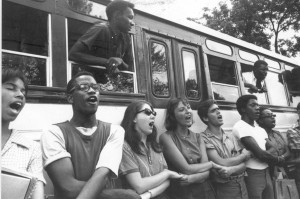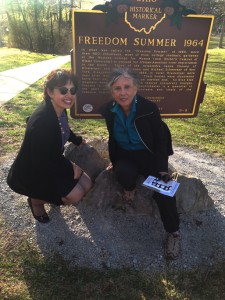|
|
In April I spoke at Miami University in Oxford, Ohio and visited the Freedom Summer Memorial on their campus. The history of Freedom Summer inspired me to keep working to realize the dream of the Civil Rights movement. I hope it will inspire you as well.
Fifty years ago the summer of 1964, over a 1,000 college students packed their bags and mustered their courage. They were going to Mississippi which had the lowest percentage of African Americans registered to vote. Since the 1890’s Southern states imposed poll taxes, difficult literacy requirements, and downright intimidation to keep Black folks from voting.
These brave young students 90% of which were White were set on changing this! They gathered at Western College for Women at Oxford, Ohio (Now part of Miami University) to learn community organizing, voting laws, and how to protect themselves from the perils they would face.
It’s hard today to imagine those brutal times. The Ku Klux Klan ran shotgun using beatings, arson, harassment, and even lynching to intimidate.
The sheriffs and police arrested and beat people who were “trouble-makers.” The risks for these students were real – some were attacked and beaten. Three of them would give their lives. Their bodies found buried beneath an earthen dam.
Freedom summer captured national attention. White middle-class college students being beaten and dying in Mississippi? President Johnson gained passage of the Civil Rights Act that summer. In 1965 the Voting Rights Act passed. Freedom Summer showed the power young people have to create change. (Of course, this was in concert with the other movements of these times!)
As I meet college students today, I wonder do they take the gains of the Civil Rights movement for granted. Yet as we look at the future awaiting them, this generation has good reason to get involved.
The national debt stands at $10 trillion, or $30,000 per person; one out of two is predicted to get cancer; and they will not live as long as their parents. In 2009, 67 percent of college graduates had debt, averaging $24,000. And a 44% unemployment rate awaits recent college graduates.
 We were in this auditorium, and they tell us: “Three people are missing.” And the next day we all got on the bus to Mississippi. We were in this auditorium, and they tell us: “Three people are missing.” And the next day we all got on the bus to Mississippi. |
We also know racial and economic barriers still exist. Last year the Supreme Court struck down key components of the Voting Rights Act and ruled that states can ban affirmative action in public college admissions. Today, African Americans are incarcerated at six times the rate of whites. If current trends continue, one in three black males born today will be imprisoned in his lifetime. Women earned 67% of what men earned in 2013. Latinos immigrants face deportation and continued harassment.
Statistics on Millennials (born 1980-2000) show nine out of ten feel responsible to make a difference. Eighty-four percent see the gap between the rich and the poor as too wide; 94 percent think this must be changed. And they are casting civil rights wider to include sexual orientation. Raised by women who believed in gender equality, 88 percent believe women should have an equal role in society. What can be done to ensure that this desire for change becomes a force that ensures equality and prosperity for their future and for generations to come?
First, students must know their history. Even at Miami University where Freedom Summer began, this story is not known. Students do not understand that the gains they enjoy today (particularly women who now make up the majority of students on college campuses) are only because of the movements of the nineteen sixties. Shouldn’t an understanding of the social movements that changed America be part of a young person’s education?
Second, Civil Rights was an intergenerational movement. Today four generations work side by side. Let us commit to reaching across the years. The Boomers retiring today have experience, time and resources to share with young people. How can we retire when there is so much left to do? Third, women have made tremendous gains. As the majority they can lead the way towards realizing a truly equitable society. Fourth, let us remember that Civil Rights is not just a political movement – it is a spiritual movement that embraces justice and equality for all people.
Fifty years later, the students of Freedom Summer are in their twilight years. Let us honor them by working to fulfill the dream of Civil Rights. Remembering Freedom Summer can rekindle the flame of democracy and motivate young people to get involved and create a better future.
Juana Bordas is the author of the award winning books, Salsa, Soul, and Spirit: Leadership for a Multicultural Age and The Power of Latino Leadership. She is president of Mestiza Leadership International an organization that promotes leadership and diversity.
References:
Reuters Article: Jobs become more elusive for recent U.S. college grads -NY Fed
NAACP: Criminal Justice Fact Sheet
Greenberg Eric and Karl Weber: Generation We: How Millennial Youth are Taking on America and changing our world forever.








